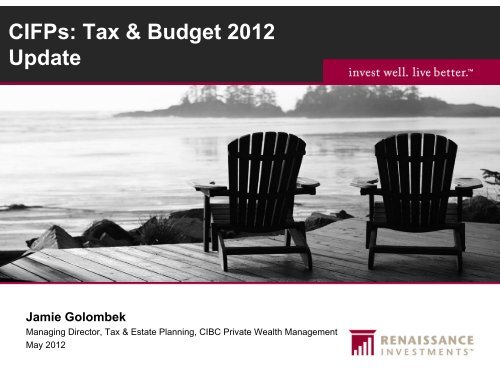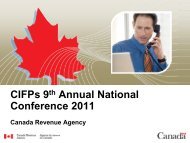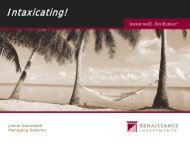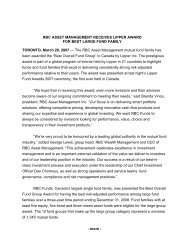CIFPs: Tax & Budget 2012 Update
CIFPs: Tax & Budget 2012 Update
CIFPs: Tax & Budget 2012 Update
- No tags were found...
You also want an ePaper? Increase the reach of your titles
YUMPU automatically turns print PDFs into web optimized ePapers that Google loves.
<strong>CIFPs</strong>: <strong>Tax</strong> & <strong>Budget</strong> <strong>2012</strong><br />
<strong>Update</strong><br />
Jamie Golombek<br />
Managing Director, <strong>Tax</strong> & Estate Planning, CIBC Private Wealth Management<br />
May <strong>2012</strong>
Agenda<br />
Know your tax rate<br />
Personal tax case update<br />
<strong>Tax</strong>ation of advisors’ commissions<br />
<strong>Budget</strong> <strong>2012</strong> – select personal tax issues
What are the <strong>2012</strong> tax brackets<br />
Federal Brackets<br />
Rate<br />
$42,707 or less 15%<br />
$42,707 to $85,414 22%<br />
$85,414 to $132,406 26%<br />
Over $132,406 29%
Trivia Question 1<br />
What percentage of Canadian tax-filers had total income less than $50,000 in<br />
2009<br />
a) 35%<br />
b) 45%<br />
c) 55%<br />
d) 65%<br />
e) 75%<br />
49,999 99<br />
49,999 99<br />
50000 00
Trivia Question 2<br />
What percentage of Canadian tax-filers earned<br />
less than $100,000 in 2009<br />
a) 83%<br />
b) 87%<br />
c) 91%<br />
d) 95%<br />
e) 99%<br />
99,999 99<br />
99,999 99<br />
50000 00
Trivia Question 3<br />
What percentage of Canadian tax-filers earned<br />
more than $250,000 in 2009<br />
a) 4%<br />
b) 3%<br />
c) 2%<br />
d) 1%<br />
e) Under 1%<br />
250,000 01<br />
250,000 01
What is this
Case Study<br />
Interest income - $15,000<br />
Eligible dividends - $50,000<br />
Stock<br />
• Proceeds - $100,000<br />
• ACB - $ 38,000<br />
• Commissions $ 2,000
<strong>Tax</strong> rates – Average v. Marginal<br />
Cash income $125,000<br />
<strong>Tax</strong>able income $115,500<br />
• Dividends (@ 141%) $70,500<br />
• Capital gains (50%) $30,000<br />
• Interest income $15,000<br />
Marginal <strong>Tax</strong> Rate 39%<br />
Total <strong>Tax</strong>: (Fed + ON) $ 16,387<br />
Effective tax rate 14%
A (Non) Typical Family<br />
Income of $100,000<br />
Two kids<br />
RRSP - $18,000<br />
RESP - $ 5,000 (maximize CESGs)<br />
TFSA - $10,000<br />
<strong>Tax</strong> - $20,000 (net of RRSP refund based on $18K)<br />
Net income after tax - $47,000<br />
• Mortgage<br />
• Groceries<br />
• Life
Clients need help…<br />
RESP<br />
RDSP<br />
TFSA<br />
RRSP<br />
Mortgage
Canadian foreign reporting forms<br />
Canada is looking more carefully at foreign reporting:<br />
• T1134-A: Information Return Relating to Foreign Affiliates that<br />
are not Controlled Foreign Affiliates<br />
• T1134-B: Information Return Relating to Controlled Foreign<br />
Affiliates<br />
• T1135: Foreign Income Verification Statement<br />
• T1141: Information Return in Respect of Transfers or Loans to a<br />
Non-Resident Trust<br />
• T1142: Information Return in Respect of Distributions from and<br />
Indebtedness to a Non-Resident Trust<br />
Reporting is required for all Canadian residents<br />
(including U.S. citizens who reside in Canada)
Report Offshore Stash (T1135)<br />
Foreign income verification statement<br />
More than $100,000 (CDN)<br />
• Funds in foreign bank accounts<br />
• Shares of non-resident corporations<br />
• Foreign real estate<br />
EXEMPT<br />
• Canadian mutual funds<br />
(even if own foreign shares)<br />
Penalty - $25/day (Max $2,500)<br />
If “gross negligence”, penalty<br />
increases to $500/month<br />
(Max $12,000)<br />
13
T1135 – Foreign Income Verification Statement<br />
CRA changed its “one chance” administrative policy and assesses<br />
penalties even for first-time failure<br />
2009 & 2010 T1135 cases:<br />
• Leclerc v The Queen (2010 TCC 99)<br />
• Sandler v. AG (2010 FC 459)<br />
• Seabrook et al v The Queen (2009 TCC 532)<br />
2011 Asper cases – 7 companies:<br />
• T1135s not filed from 2000 to 2005, but all income reported<br />
• Penalties (over $75,000) upheld under judicial review<br />
• FCA dismissed appeal<br />
“although the Minister's decision was unreasonable, no practical end<br />
would be served by returning the matter to him for redetermination”
T1135 – Foreign Income Verification Statement<br />
<strong>2012</strong> decision<br />
Bruce Douglas<br />
2008 return, due June 15, 2009<br />
• Filed March 2010<br />
$2,500 penalty + interest<br />
Objected – <strong>Tax</strong> Court of Canada<br />
“(T)his Court has held that even strict penalties<br />
should not be applied if a taxpayer has taken all<br />
reasonable measures to comply with the<br />
legislation.”
<strong>Tax</strong>ation of Insurance Commissions<br />
- Advisors’ Own Policies<br />
CRA’s Interpretation Bulletin IT-470R:<br />
• “where a life insurance salesperson acquires<br />
a life insurance policy, a commission received<br />
by that salesperson on that policy is not<br />
taxable provided the salesperson owns that<br />
policy and is obligated to make the required<br />
premium payments thereon.”<br />
CRA update:<br />
• “where the particular salesperson has<br />
purchased the particular life insurance policy<br />
for personal use rather than investment or<br />
business purposes.”
<strong>Tax</strong>ation of Insurance Commissions<br />
- Advisors’ Own Policies<br />
Bilodeau v. the Queen (2009 TCC 315)<br />
• Two $1 million Transamerica Life UL policies<br />
• Deducted $43,000 of commissions as an expense<br />
Judge: $43,000 of commissions received was<br />
taxable income<br />
• “Had he not been a broker, he would not have<br />
received that commission…he earned the<br />
commission in issue as part of his professional<br />
activities as a broker.”
<strong>Tax</strong>ation of Insurance Commissions<br />
- Advisors’ Own Policies<br />
Li v. The Queen (2009 TCC 530)<br />
• Insurance advisor Linzi Li denied a $7,000<br />
commission income deduction offset<br />
• Judge: “there are no provisions in (the Act) that allow<br />
such a deduction.”
<strong>Tax</strong>ation of Insurance Commissions<br />
- Advisors’ Own Policies<br />
2010 CALU CRA Roundtable<br />
• CRA asked to provide guidance<br />
• Situations or fact patterns<br />
• Apply Bilodeau vs. its administrative position<br />
• “the administrative position described in paragraph 27 of IT-<br />
470R would not apply where the amount of commission income<br />
was significant.”<br />
• CRA stated that its administrative position “is not intended to<br />
apply where the insurance was obtained for investment or<br />
business purposes.”<br />
<strong>2012</strong> CRA Technical Interpretation<br />
• Non-taxable policy does not apply to home & auto insurance
<strong>Tax</strong>ation of Insurance Commissions<br />
- Advisors’ Own Policies<br />
Bégin v The Queen (Bégin v The Queen, <strong>2012</strong> TCC 18)<br />
• Deducted premiums paid in order to obtain commissions<br />
• Let policies expire without having to repay commissions<br />
• Profitable = commissions received > premiums paid<br />
• Plan was to “abandon the life insurance policies shortly before<br />
the end of the minimum membership period, which was 24<br />
months.”<br />
• “objective was to earn income by using to his advantage the<br />
system some insurance companies use to pay their<br />
salespersons.”<br />
Judge: Commission earned “while practicing his<br />
profession as insurance agent and is therefore taxable.”<br />
Judge: Premiums were “personal or living expenses” that<br />
are specifically not deductible under the Income <strong>Tax</strong> Act.
<strong>Budget</strong> <strong>2012</strong><br />
Changes to the OAS system<br />
Registered Disability Savings Plans (RDSPs)<br />
Employee Profit Sharing Plans<br />
Travellers’ Exemptions<br />
The Penny (A lesson in rounding)
OAS Changes – The Three Pillars<br />
1. OAS/GIS system<br />
2. CPP/QPP system<br />
3. Voluntary tax-assisted savings (RRSPs,<br />
TFSAs, PRPPs)
OAS Increase in Life Expectancy
OAS Decline in Workers Per Senior
OAS – Age Limit<br />
Currently collect at age 65<br />
<strong>2012</strong> maximum - $6,481<br />
Clawback<br />
• Starts at $69,562<br />
• …15% up to…<br />
• Ends at $112,772<br />
Moving to age 67
OAS – Age limit – Changes<br />
Implementation begins April, 2023<br />
Ends January, 2029<br />
Won’t affect current OAS recipients<br />
If you are 54 years or older today (born before April 1,<br />
1958)<br />
-- Age 65<br />
Born on February 1, 1962 or later<br />
-- Age 67<br />
Born between April 1, 1958 and January 31, 1962<br />
-- Phase in
OAS Phase-in Chart
Option to Defer OAS Payments<br />
<br />
<br />
Voluntary deferral of OAS pension for up to five years<br />
Actuarially neutral<br />
Starting on July 1, 2013<br />
Example #1<br />
» Michael turns 65 in<br />
September 2013<br />
» Defers pension to age 66<br />
» Annual pension would be<br />
$6,948 vs. $6,481 (in<br />
<strong>2012</strong> dollars)<br />
Example #2<br />
» Rita turns 65 in December<br />
2013<br />
» She forgoes OAS until age 70<br />
» Annual OAS would be $8,814<br />
vs. $6,481 (in <strong>2012</strong> dollars)
OAS/GIS – Proactive Enrolment<br />
Must currently apply to get OAS<br />
Otherwise, can only collect 11 months<br />
retroactively<br />
Grosvenor v AGC, 2011 FC 799<br />
Starting in 2013, proactive enrolment regime to<br />
be phased in (to 2015)
Registered Disability Savings Plans (RDSPs)<br />
• $200,000 lifetime contribution limit<br />
• Age 59 and under to open an RDSP, up to age 49 to<br />
get government funds<br />
• Complex withdrawal requirements
RDSPs - Government Benefits<br />
Matching Canada Disability Savings Grants<br />
(CDSG)<br />
• Family income < $85,414<br />
»300% of first $500<br />
»200% of next $1,000<br />
• Family income > $85,414<br />
»100% of first $1,000<br />
• Lifetime max: $70,000
RDSPs - Government Benefits (continued)<br />
Canada Disability Savings Bonds (CDSB)<br />
• Family income < $24,863<br />
• $1,000 annually (no contributions required)<br />
• Family income > $24,863<br />
» Reduced pro-rate until eliminated at<br />
income > $42,707<br />
• Lifetime max: $20,000
Improvements to RDSPs<br />
Plan holders over age of majority<br />
Proportionate repayment rule<br />
Maximum and minimum withdrawals<br />
Rollover of RESP investment income<br />
Termination of RDSP following cessation of<br />
eligibility for the DTC
Employees Profit Sharing Plans (EPSPs)<br />
34
EPSP Features<br />
Non-arm’s length employees can participate<br />
Unlimited contributions by employer and employee<br />
No income tax withholding at the time of contributions to<br />
an EPSP (deferral of tax until April 30 of following year,<br />
no installments)<br />
No CPP or EI premiums<br />
Income-splitting can be achieved<br />
No vesting period<br />
No restrictions on qualifying investments<br />
No registration with CRA or other agencies
EPSP – Government Consultations<br />
Government announced consultation with stakeholders<br />
on August 30, 2011<br />
End of consultation period: October 25, 2011<br />
Issues for consultation include:<br />
1. Eligibility to participate in an EPSP (non-arm’s length employees)<br />
2. Limitations on contributions<br />
3. Withholding requirements (income taxes, CPP & EI premiums)<br />
4. Role of minor children (income-splitting)
EPSP – <strong>Budget</strong> <strong>2012</strong><br />
<br />
<br />
EPSP payments made to a “specified employee”<br />
• An employee who has a significant equity interest in their employer<br />
• Does not deal at arm’s length with their employer.<br />
New tax payable on an “excess EPSP amount”<br />
• EPSP allocation > 20 per cent of employee’s salary<br />
Applicable to EPSP contributions made on or after March 29, <strong>2012</strong>
Travellers’ Exemptions<br />
<br />
Current Rules<br />
• Under 24 hours ZERO<br />
• More than 24 hours $50<br />
• More than 48 hours $400<br />
• More than 7 days $750<br />
As of June 1, <strong>2012</strong><br />
• Under 24 hours ZERO<br />
• More than 24 hours $200<br />
• More than 48 hours $800<br />
<br />
No changes to booze/tobacco limits!
Eliminating the Penny
Canada’s last (new) penny…<br />
Source: CBC
Eliminating the Penny<br />
<br />
<br />
<br />
<br />
<br />
<br />
Royal Canadian Mint ceased production of new pennies<br />
Cent will remain Canada’s smallest unit for pricing goods & services<br />
Pennies can be used in cash transactions indefinitely<br />
Non-cash payments, such as cheques, credit cards and debit cards will<br />
continue to be settled to the cent<br />
When pennies are not available, cash transactions should be rounded to the<br />
nearest five-cent increment<br />
• “fair and transparent manner”<br />
Rounding should only be used on the final bill of sale after the calculation of<br />
GST/HST
Rounding Down / Up
Rounding Down / Up - Example
Rounding Down / Up - Example
www.jamiegolombek.com<br />
Thank You<br />
This material was prepared for investment professionals only and is not for public distribution. It is for informational<br />
purposes only and is not intended to convey investment, legal, or tax advice. The material and/or its contents may not be<br />
reproduced without the express written consent of CIBC Asset Management. Renaissance Investments and "invest<br />
well. live better." are registered trademarks of CIBC Asset Management Inc.






